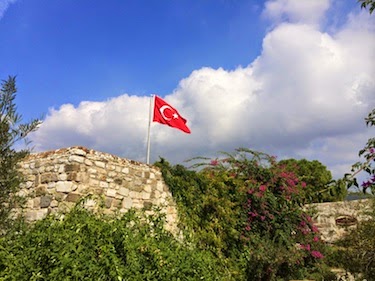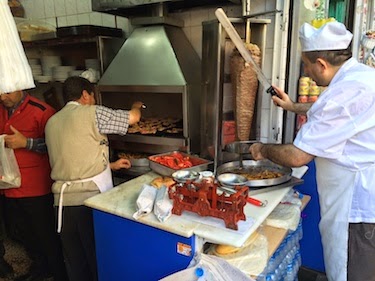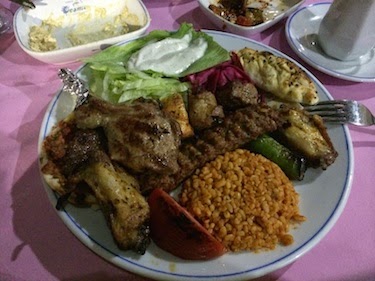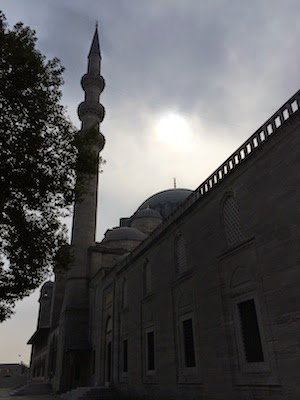One of the “bonus” museums we got with our Istanbul museum card was the Museum of the History of Science and Technology in Islam. It gets this travel blog’s award for “Longest Named” museum of our 2014 travel adventure. Although we learned some interesting things, it has few actual artifacts (it’s filled instead with replicas and models), and it works too hard to make sure you understand the contribution of Islamic scholars and scientists to mankind’s body of knowledge.
Those Islamic contributions are undeniable. Driven by the need to know precise times for prayer and the direction of Mecca, they excelled in astronomy and mathematics centuries before their counterparts in Europe. They built huge and amazingly accurate observatories that were not only functional but artistically beautiful. Extending scientific process into biology (a thought that hadn’t yet occurred to anyone in Europe), they made major discoveries in human anatomy, such as mapping the circulatory system. The list goes on, and not only did they make scientific discoveries, they actually applied their findings in inventive technological ways, from early surgical equipment to a steam-powered doner kabob cooker built in the 1500’s (you might laugh at its mundane application–or my interest in it–but steam engines didn’t hit practical applications in Europe for another 200 years).
If you’ve ever visited Disney’s EPCOT center and taken a ride on Spaceship Earth, you should already be familiar with the impact of Islamic scholarship on world culture. I can still hear Walter Cronkite’s voice as we would glide past the smoldering remains of the collapsed Roman empire, “But all is not lost, for Islamic and Jewish scholars continue to preserve ancient wisdom…” But there’s unfortunately good reason why this museum is filled with replicas instead of originals: in dozens of cases, the card next to the replica on display would bear the footnote, “Original in London”, or “Original in Paris”. As Europe emerged from the Dark Ages and finally began catching up to Islamic (and Asian) scholars, they also began exploring the world and bringing those interesting devices back to Europe where many remain today. And all too often, the scholarly research “discovered” during those travels was carried back to Europe, translated from the original Arabic, and credit given to the translator or their European sponsor instead of the original scholar.
As we said, this museum works hard to reclaim a bit of that due credit, to get some well-deserved attention. The same could be said of today’s Turkey in general. Their efforts seem to be working: they’re basking in top travel list glory at the moment, with Istanbul practically everyone’s new “gotta see” destination. Turkey’s secular-society / Muslim population balancing act is laudable, and we hope it’s as resilient as their economy and democracy seem to be. On the one hand they strive to be European, accepting Euros (and Dollars) as readily as Turkish Lire and setting their work week to Monday through Friday like the Western, Christian world; on the other, reminders of Muslim life are everywhere, from burka-clad women to the sometimes cacophonous calls to prayer to their current President suggesting that women should be required to cover their heads in public.
Whenever we’ve moved on from one country to the next, often sitting in the airport waiting for our flight out, we usually ask each other, “What did you think of this place?” It’s hard to say we “loved” Turkey, the same way we readily said we loved Portugal and Ireland. Turkey is a fascinating and beautiful place, to be sure. We ask then, “Would we come back?” and “Why would we come back?” The answers to these two questions are easier.
We would love to return to Turkey and spend months exploring the Aegean and Mediterranean coastal and island towns of Kos, Fethiye, Antalya, and Alanya. We’d love to visit the ancient biblical towns and ruins like Ephesus, take more gullet cruises, and even travel inland to Cappadocia.
What about Istanbul? We enjoyed this great city, but it will likely be an “opportunity” destination for us for the foreseeable future (meaning we’ll come here on our way to or from someplace else). What would bring us back to Istanbul would be either to accompany family or friends who really want to visit, or to fulfill a craving for that wonderful Turkish cuisine.










